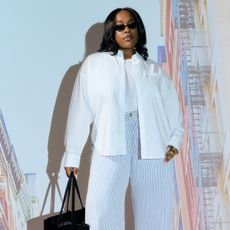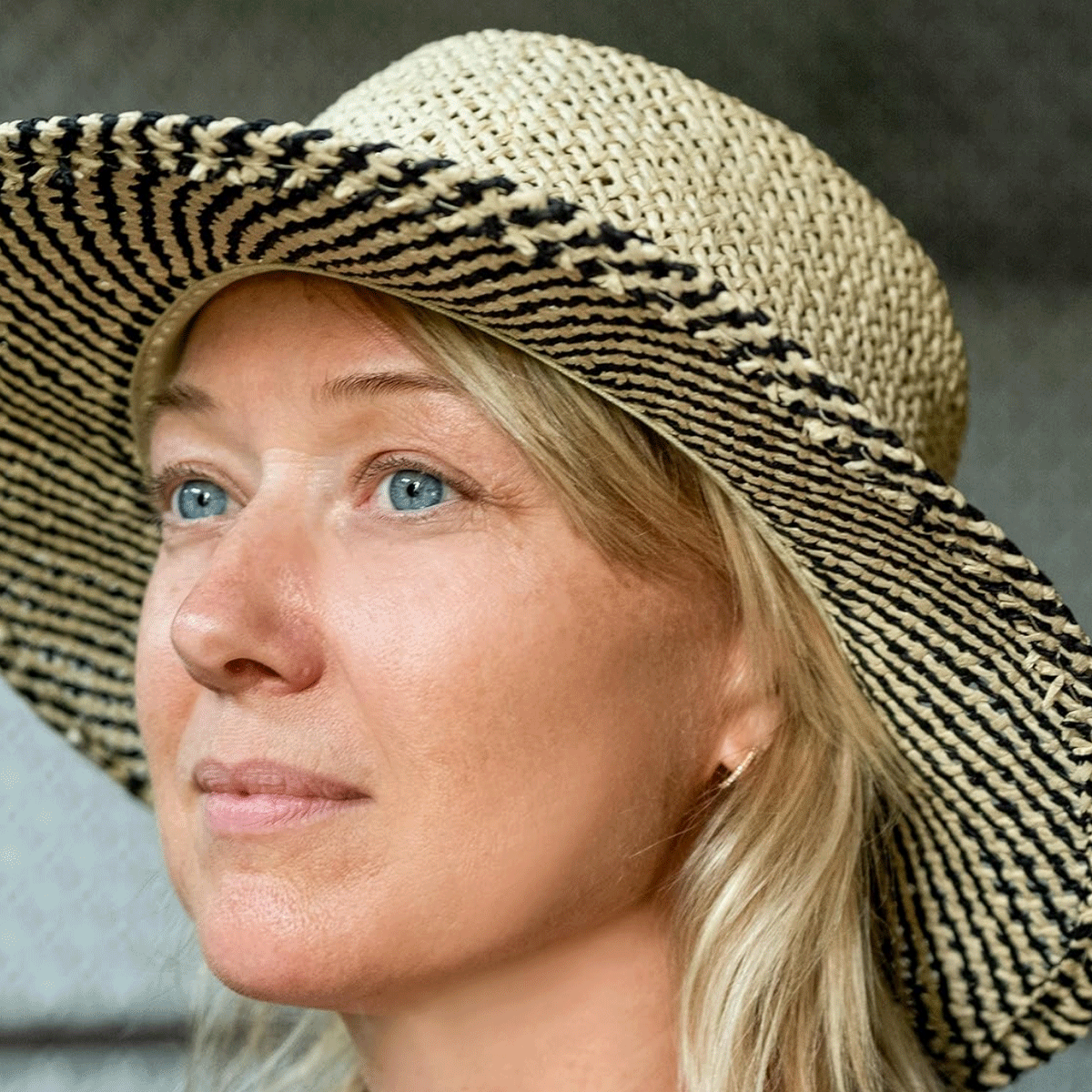Jeanne Damas on Authenticity, Her Tumblr Days, and the Legacy of Karl Lagerfeld
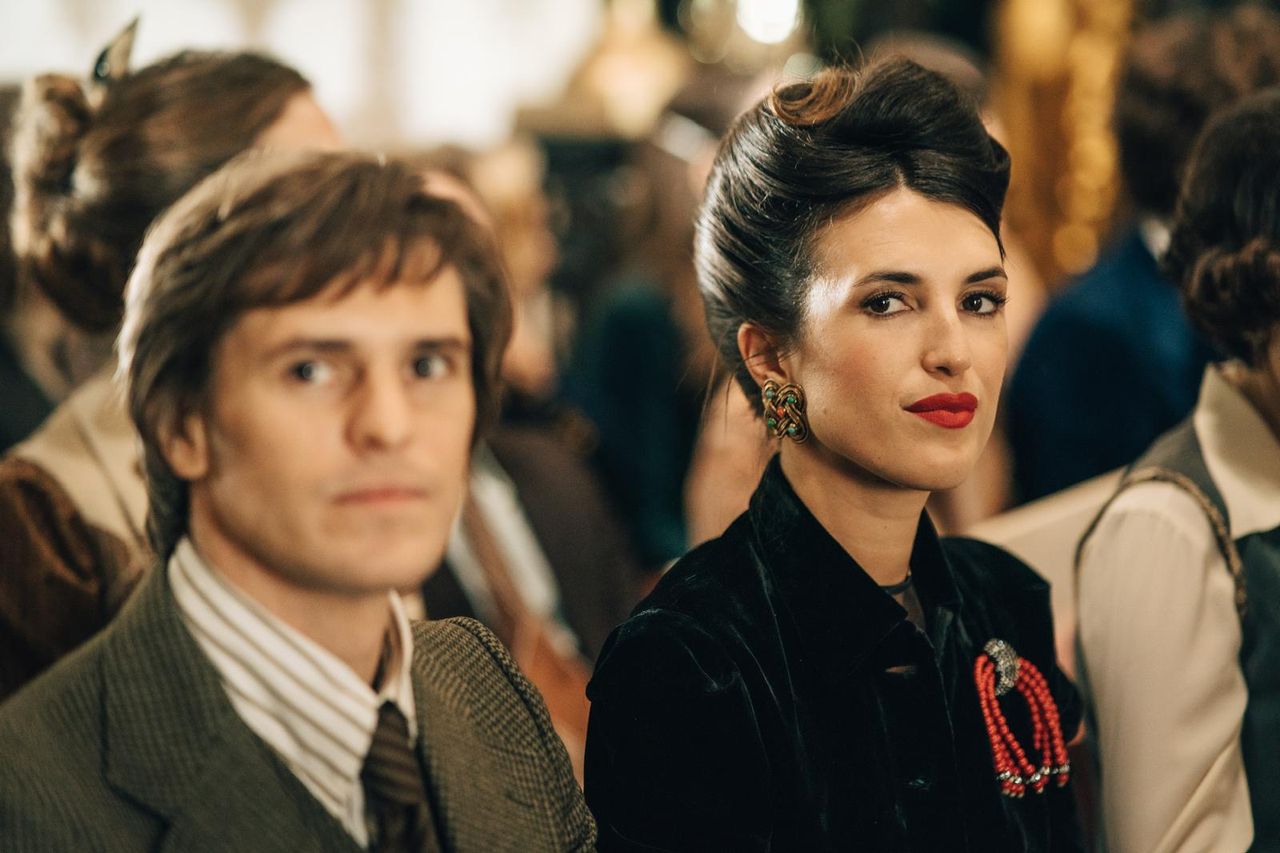
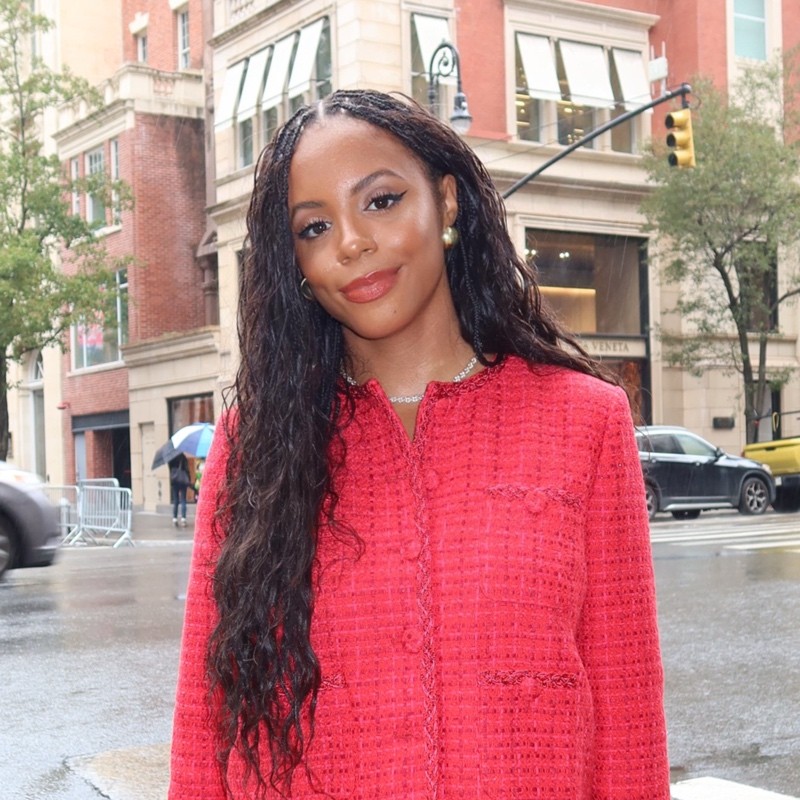
We're in an era of film and television where casting has become more personal than ever. Directors aren't searching for actors anymore as much as they're searching for someone who already lives the life of the character they've imagined. When the role came up for Paloma Picasso in the Hulu series Becoming Karl Lagerfeld, Jeanne Damas was the casting director's first and only call.
A designer with her own brand, a socialite, a red-lipstick aficionado, and a Parisian woman—Damas was a natural choice for this job. She stepped into Picasso's shoes and controversial red wedding dress and took on the role as if it were her own life.
What makes this short but powerful series so captivating is that it feels quite like you've stepped onto the streets of Paris in the 1970s and 1980s, and the characters speak predominately in French. Subtitles guide you along cobblestone streets lined with cars from the historic era that started it all as you step into the exact hotels, clubs, and neighborhoods that Karl Lagerfeld, Picasso, and the rest of the crew hung out. The result? An experience that feels like you're walking alongside Lagerfeld as his career plays out, from the early days spent admiring Yves Saint Laurent's runway work to announcing his role as creative director of Chanel.
We spoke with Damas about her experience being chosen for this role, her critique on French girl style that may surprise you, and the legacies of Paloma Picasso and Karl Lagerfeld.
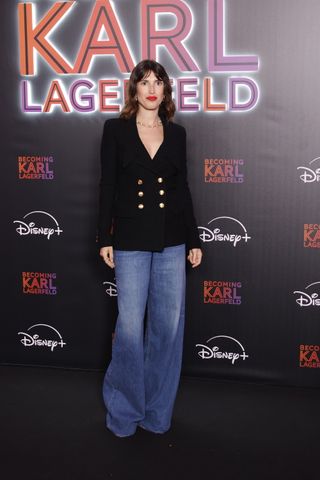
The obvious comparison between you and Paloma Picasso is the red lip, but what else do you feel like you have in common?
She was a socialite. She was in the fashion industry. We have the signature red lip in common, and we share a sense of style that honors the '40s and retro vibes. We also share a similar professional journey—we are both the muse to designers, and she also had her own brand. It was really modern of her in the '80s because not a lot of women had brands.
What drew you to that retro-inspired sense of style that you mentioned?
What I like about this style is that it's me. I don't follow trends. I've had my own style and my own look since forever. I've been really influenced by film and inspired by the cinemas and the actresses I saw in classic movies.
We might describe both you and Picasso as "French girl style" icons. What do you think of that phrase? What does French style mean to you?
I don't know why people are fascinated by French girl style because I like to say that our style in Paris is quite boring. Maybe it's the city and the culture that people love. When you come to New York or London, it's completely more attractive, original, and creative.
As you were getting acquainted with the character of Paloma Picasso, how did you get to know her and prepare to take on the role?
I read some books that are really famous. One is called Beautiful People. It's a book by Alicia Drake, and it's really interesting. It talks about the '70s in Paris, the fashion industry, the end of the haute couture era, and the beginning of prêt-à-porter. It speaks about the relationships between Yves Saint Laurent and Karl Lagerfeld and includes Paloma along with the rest of the cast. It's all about the vibes of this era, so it's very interesting. I also read Paradise Now: The Extraordinary Life of Karl Lagerfeld by William Middleton, which is what inspired the series. That is an interesting read as well.
The series explores the rise of Karl Lagerfeld in the fashion world and his time as creative director at Chanel, a brand you've worked with closely in your career. How have Lagerfeld and Chanel influenced you?
The truth? Chanel is iconic. I don't know one girl who doesn't want a Chanel bag. What really excites me, though, is the Karl Lagerfeld personality and his career journey. It's amazing what he achieved. He was the inventor of the creative director job—he had a vision. He was a genius in fashion, so he's really fascinating for that.
What was your favorite costume that you wore during the show?
The most iconic was my wedding dress. It was completely iconic and crazy because it was not white. It was red, not your typical wedding dress. It was made from satin and really big materials.
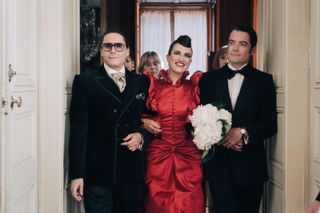
How did wearing a Picasso-inspired wardrobe help you get into character?
That's how I began to feel the role and the character—when I began to research with the costume designer, Pascaline Chavanne. She's a really famous costume designer in Paris. In France, she's one of the best. I know fashion, but it's different when it comes to cinemas. So it was really interesting to research the area and learn about the psychology and the persona of the character through the lens of fashion. It really got me into the role.
How did this role find you?
I know that they chose me before the casting. It was really quick. Two weeks after the casting, they said, "It's you." Normally when you do casting, they call you back, and you have to do another casting and another. This time, it was just one. I was surprised and happy they told me that they wanted me for the show.
Were you filming in Paris?
Some work was done in studios, but most of it was in real spaces, real hotels, really beautiful places. It was amazing with all the extras, who wore '70s clothes, and all the vintage cars on the streets. You really felt like you're in that time period.
What was it like being on set every day?
It was really intense. In between takes, I was on Zoom with my teams for Rouje. There was never a dull moment.
It's been a few years since your most recent acting role. What inspired you to take time off from acting to focus on fashion?
My brand. It was not on purpose. … At the beginning, it was a small team. I wanted to create because I was passionate about it, but I didn't plan that it was going to be really big. It became successful within the first year, so I stopped everything because acting is a full-time job. Being a designer is a full-time job too, so you have to choose. I was really happy to do this series and accept this role because it's really inspiring. Getting out of my comfort zone and discovering another world, it was really interesting.
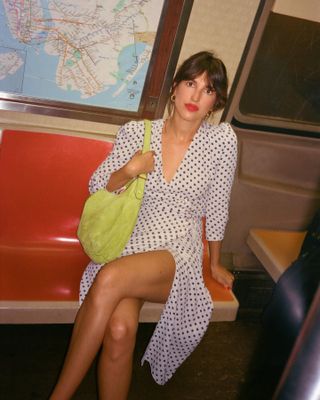
How did you first start your career?
It was a long journey. I was passionate about photography when I was young because, you know, the festival of photography in France. I used to go every year when I was a child, so I loved photos. I had all of my cameras all the time. I took photos of my life, of my friends, of my mother, of my travels to Paris, of my environment, and I put them on Tumblr or on Blogspot at the time when I was about 14. It became famous because my photos resonated with people, and a few years later, an agency (IMG) called me in to sign me, and I became a model. When I was a model, I met a lot of designers, like Jacquemus—French designers and Americans too. I traveled, so for 10 years as a model, I met a lot of people from the industry. It was like a 10-year internship in fashion. I got to know all of the career paths, and at 24 years old, I decided to create my brand.
What made you want to start the brand?
I really had something to share. I had a real universe around me. The style in France was really all black and suits. I wanted more colors and more femininity. My brain is more Parisian but from the south—like with a Mediterranean touch. So I brought that to Paris. I wanted to bring my ideas and my universe to life. That's why I created Rouje, and I didn't want to put my name on the brand because I was an actress too. I wanted to differentiate things. I always wore red lipstick since I was young, and it has been my signature. In French, the color is spelled "rouge" with a G, but I swapped in a J for my name.
Tell us what your summer style looks like for 2024. Are there any pieces you're interested in?
It's all about comfort. I love a dress inspired by men's shirts. I love pants. I love cotton fabrics. I'm looking for really comfortable and quality materials. I like clothes that are quite simple but always with a touch of color. Oh yeah, and basket bags. They're important during summer.
What designers are inspiring you right now?
Dries Van Noten was one of my favorites. I love Vivienne Westwood. That's always a classic. I love some New York designers like Khaite. However, I don't do a lot of shopping these days because I don't have time.
What advice do you have for young women looking to follow your career path?
Just follow your instincts, and don't try to copy something. Bring your own personality and your own message. … Today in fashion, there are too many people, so if you don't have an authentic message, it's not worth it.
Becoming Karl Lagerfeld is streaming now.

Sierra Mayhew is a fashion editor at Who What Wear, bringing a decade of industry experience to the editorial team. Since joining in 2021, she has made her mark by blending luxury and accessible fashion, decoding runway trends, and curating must-have shopping lists. Before joining Who What Wear, Sierra sharpened her skills at Harper's Bazaar and Elle, with bylines in Bazaar.com and collaborated with iconic brands such as Gucci and Ferragamo. A graduate of the University of Notre Dame, Sierra translates editorial expertise into viral social content, making fashion engaging for a new generation. Her unique perspective is rooted in her love for travel, music, and discovering the hidden gems that make New York City a constant source of inspiration.
